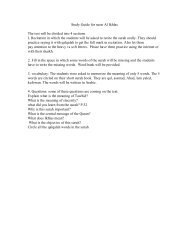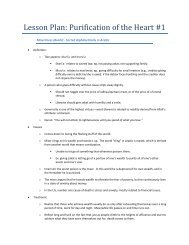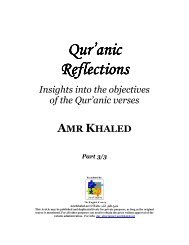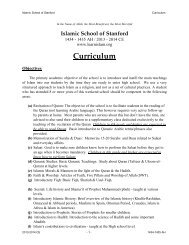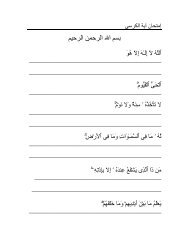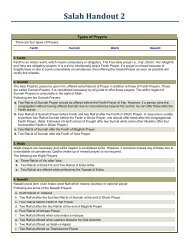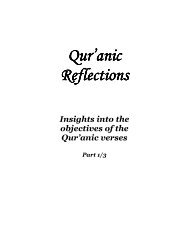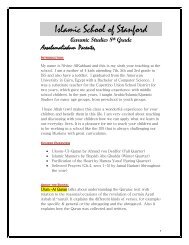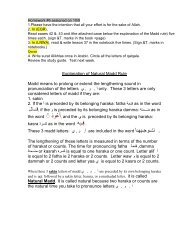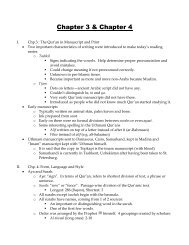Quranic Reflections - Islamic School of Stanford
Quranic Reflections - Islamic School of Stanford
Quranic Reflections - Islamic School of Stanford
Create successful ePaper yourself
Turn your PDF publications into a flip-book with our unique Google optimized e-Paper software.
the earth against earthquakes.<br />
• The blessing <strong>of</strong> the creation <strong>of</strong> the stars; Allah (SWT) says what can be<br />
translated as, “And way marks; and by the star they are guided” (TMQ,<br />
16:16). These stars point us in all directions when traveling, in addition to the<br />
qibla (the direction <strong>of</strong> Makkah).<br />
• The blessing <strong>of</strong> cattle’s milk; Allah (SWT) says what can be translated as,<br />
“And surely in (the) cattle (there) is indeed a lesson for you. We give you<br />
to drink <strong>of</strong> what is in their bellies, even between filth and blood,<br />
exclusively (pure) milk, palatable to the drinkers”, (TMQ, 16:66).<br />
Can you imagine the area from which pure milk comes in pleasant taste and<br />
odor, from among blood and stool Nevertheless, it comes clean and pure<br />
without a drop <strong>of</strong> blood or dung! “exclusively (pure) milk, palatable to the<br />
drinkers”.<br />
• The blessing <strong>of</strong> knowledge, hearing, and sight; Allah (SWT) says what can be<br />
translated as, “And Allah brought you out <strong>of</strong> your mothers bellies not<br />
knowing anything …” (TMQ, 16:78); then he gave us the tools to acquire<br />
science, “… and He has made for you hearing and be holdings (i.e. eye<br />
sights) and heart-sights, (i.e., perception “s”) that possibly you would<br />
thank (Him)” (TMQ, 16:78).<br />
• The blessing <strong>of</strong> birds; Allah (SWT) says what can be translated as, “Have they<br />
not regarded the birds subjected in the firmament <strong>of</strong> the heaven In no<br />
way does anyone hold them except Allah. Surely in that are, indeed, signs<br />
for a people who believe” (TMQ, 16:79).<br />
The question here is, which one <strong>of</strong> us would take that into consideration and<br />
be thankful Who would employ his bestowed blessings and use them in what<br />
pleases Allah (SWT) to gain His contentment<br />
“And in case you number the favor (s) <strong>of</strong> Allah, you will not numerate them”<br />
(TMQ, 16:18)<br />
After mentioning all those blessings comes a core ayah; Allah (SWT) says what can be<br />
translated as, “And in case you number the favor (s) <strong>of</strong> Allah, you will not<br />
enumerate them; surely Allah is indeed Ever-Forgiving, Ever-Merciful” (TMQ,<br />
16:18). But what is to be counted Do we count the known and tangible blessings or<br />
the intangible ones If we assume that we could count up the concrete blessings,<br />
could we then calculate the benefits that each blessing encompasses In the Qur’an,<br />
Allah (SWT) says what can be translated as, “And in case you number the favor (s)<br />
<strong>of</strong> Allah, you will not enumerate them …” He did not say the “favors” altogether!<br />
(In Arabic the translation <strong>of</strong> “favor”, as mentioned in this ayah, means only one).<br />
However, the ayah ends with, “…surely Allah is indeed Ever-Forgiving, Ever-<br />
Merciful”, to illustrate that man does not usually thank Allah (SWT) for the blessings



